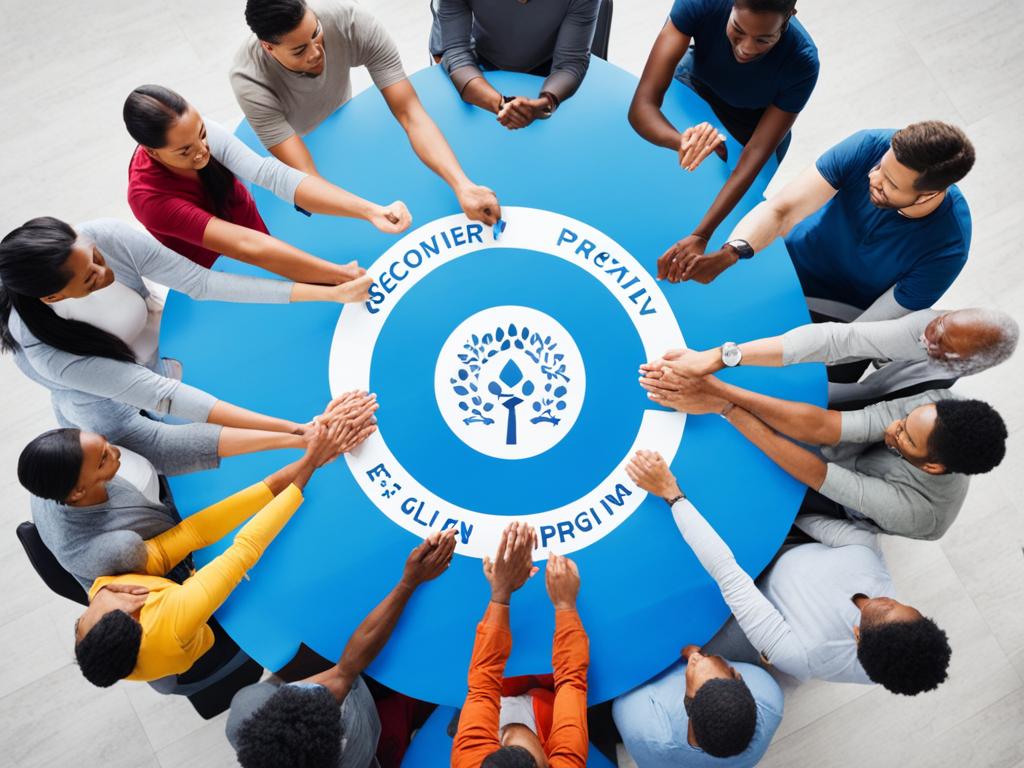Supportive Recovery Community Insights & Guidance
Welcome to our article on the importance of a supportive recovery community in addiction support and sober living. Substance abuse recovery can be a challenging journey, but it is not one that has to be taken alone. Being part of a recovery community can provide individuals with the support and resources needed to overcome addiction and maintain a healthy, sober lifestyle. In this article, we will explore what a recovery community entails, the various forms of addiction support available within it, and the tools and resources that can aid individuals in their sober living. We will also discuss the different recovery programs and services offered within the community, the significance of attending recovery events, and the importance of building a strong support system. Let’s begin our journey towards recovery success together!
Understanding the Recovery Community
A recovery community is a supportive network of individuals who are committed to achieving and maintaining sobriety. It consists of individuals who understand firsthand the challenges of addiction and are dedicated to offering ongoing support and resources to those in recovery. Being a part of a recovery community can provide individuals with a sense of belonging and connectedness, which is essential to the recovery process.
Recovery communities offer a wealth of support and resources to individuals in recovery, including mentorship, sober housing, and access to recovery meetings and support groups. These resources can help individuals stay on track in their sobriety journey and provide a safe and supportive environment to learn and grow.
Being a part of a recovery community not only offers individuals a sense of support and resources, but it also provides an opportunity for personal growth and development. By connecting with others in recovery, individuals can gain insight and perspective, learn new coping strategies, and foster friendships that can last a lifetime.
The recovery community is an essential component of the overall process of addiction support and sober living. By understanding the benefits and importance of a recovery community, individuals can take the first step towards a successful and fulfilling recovery journey.
Addiction Support in the Recovery Community
When it comes to addiction support, a key aspect of the recovery community is recovery meetings. These meetings, such as 12-step programs, provide a valuable space for individuals to share their experiences and create a supportive network. They offer a non-judgmental space where individuals can connect with others who understand the struggles and challenges of addiction.
Another important element of addiction support is building a strong recovery network. This involves connecting with individuals who are also in recovery, as well as seeking guidance and support from professionals. By building a supportive community, individuals can strengthen their commitment to sobriety and gain access to a wealth of resources and knowledge.
“Recovery is an ongoing process, and having a strong support network can make all the difference. By connecting with others in recovery, you can gain the knowledge, tools, and support necessary to maintain your sobriety and build a fulfilling life in recovery.”
Recovery meetings and a strong recovery network are just two of the many forms of addiction support available within the recovery community. By seeking out and actively participating in such support systems, individuals can increase their chances of achieving long-term sobriety and thriving in their recovery journey.
Tools for Sober Living
Living a sober life can be challenging, but there are many tools and resources available within the recovery community to help individuals maintain their sobriety. Here are a few practical tips to aid in living a sober life:
- Develop a daily routine
- Practice self-care, including exercise and healthy eating habits
- Eliminate triggers and avoid situations that may tempt you to relapse
- Attend recovery meetings regularly and build a support network
Aside from these practical tips, there are also numerous online resources and support systems available to those working towards sober living. These resources include:
- Virtual recovery meetings
- Telephone hotlines for immediate support
- Apps for tracking sobriety milestones and connecting with others in recovery
It is important to remember that everyone’s journey towards sober living is unique; therefore, it’s essential to find the tools and resources that work best for you. Incorporating a combination of practical tips, online resources, and support systems can help individuals thrive in their sobriety journey while finding their place within the supportive recovery community.
Recovery Programs and Services
Recovery programs and services are a vital aspect of addiction support and sober living within the recovery community. Professional guidance, therapy, and specialized services can enhance the recovery process significantly.
There are various types of recovery programs, including residential treatment, outpatient treatment, and detox services. These programs cater to individuals with different needs and preferences. Some people may benefit from a structured residential program that provides 24/7 support and care, while others may prefer the flexibility of an outpatient program that allows them to attend therapy sessions and continue with their daily lives.
Specialized services such as trauma therapy, mental health counseling, and addiction psychiatry can also be highly effective in addressing underlying issues that may contribute to substance abuse. These services can provide individuals with the necessary tools and techniques to overcome their addiction and maintain long-term sobriety.

Engaging in Recovery Events
Attending recovery events within the community can be a valuable part of an individual’s sobriety journey. These events offer opportunities to connect with others in recovery, bond over shared experiences, and partake in group activities.
Meeting people who share similar struggles can provide a sense of community and belonging. It can be comforting to know that you are not alone in your journey. You can gain insight and inspiration from hearing other people’s stories and experiences. Positive peer support is crucial for building a strong foundation for long-term sobriety.
Participating in group activities, such as fitness classes, outdoor adventures, and volunteer work, can be a fun and fulfilling way to embrace a new sober lifestyle. Engaging in activities with others can build confidence and provide a natural high, while also promoting a healthy, active lifestyle.
Recovery events often feature workshops, seminars, and keynote speakers offering valuable insights and information. These can be a great way to gain new knowledge and skills that can enhance your recovery experience.
Attending recovery events is also a great way to network and build connections within the recovery community. It can provide opportunities for mentorship, sponsorship, and long-lasting friendships.
In summary, attending recovery events can provide a much-needed sense of community, inspiration, and education on the path to sobriety. It can be a fun and rewarding way to engage in sober living and promote overall wellness.
Building a Strong Support System
One of the essential elements of lasting recovery is building a strong support system within the recovery community. By cultivating supportive relationships, both online and offline, individuals can gain the encouragement and motivation they need to stay on track in their recovery journey.
To start building a support system, consider attending recovery meetings and events within the community. These provide a welcoming environment to connect with others who understand the challenges of addiction and sobriety.
Another useful resource is online recovery groups, which offer a convenient way to interact with others from the comfort of your own home. These groups can provide a sense of community and a source of inspiration through shared experiences and encouragement.
Finally, getting involved in local recovery efforts and volunteering can also help individuals create a strong support system. This allows them to contribute to the community while building meaningful connections with others in recovery.

Remember, building a support system takes time, effort, and vulnerability. However, the benefits of having a network of supportive individuals can be invaluable in achieving and maintaining long-term recovery success.
Conclusion
Building a supportive recovery community is crucial for individuals seeking addiction support, sober living, and substance abuse recovery. By connecting with others in recovery, attending recovery events, and utilizing recovery resources, individuals can maintain a positive and motivated mindset throughout their journey.
Remember, a strong support system within the recovery community can make all the difference in achieving long-term recovery success. Don’t be afraid to seek out and engage with recovery programs and services, and actively cultivate supportive relationships with peers both online and offline.
In conclusion, we encourage you to take the first step towards recovery by joining a supportive recovery community today and taking advantage of the resources and addiction support available to you.



Recent Comments